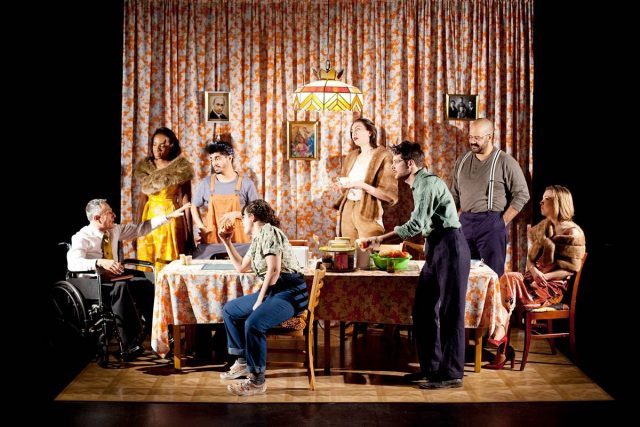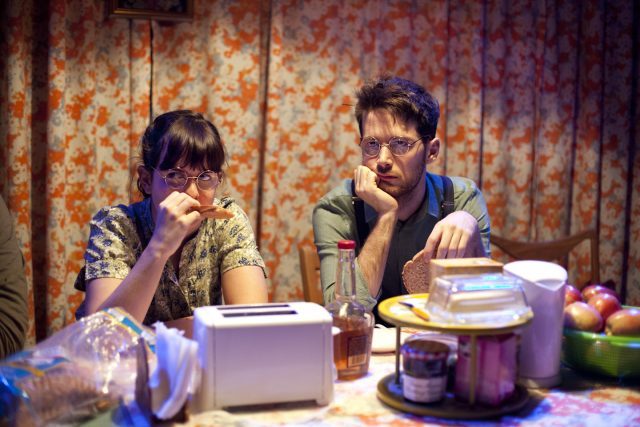
New Saloon reinterprets Chekhov’s Uncle Vanya in Minor Character at the Public Theater (photo by Elke Young)
MINOR CHARACTER: SIX TRANSLATIONS OF UNCLE VANYA AT THE SAME TIME
Martinson Hall, the Public Theater
425 Lafayette St. at Astor P.
January 11-13, $30
212-539-8500
www.publictheater.org
www.newsaloon.org
“Everyone’s a freak,” Astrov declares in Minor Character, New Saloon’s ingenious, outrageously entertaining adaptation of Anton Chekhov’s 1898 play, Uncle Vanya. But the freakiest thing is the play itself, a mash-up of six different translations, by Marian Fell, Laurence Senelick, Paul Schmidt, Carol Rocamora, company cofounder Milo Cramer, and, perhaps most profoundly, Google Translate. The result is an exhilarating procession of unpredictable language; sometimes the dialogue, performed by an outstanding cast, takes one line from one translation, the next from another, etc. But at other times a line is repeated in up to six different phrasings, highlighting the subtle and extreme ways translations differ from one another — and ultimately, of course, how different communication itself can be. For example, in his opening monologue Astrov says, “I’m over-worked, Nanny. I work too hard, Nanny. I’ve been working too hard, Nanny old girl. And I’m bored. Life is boring, it’s stupid, it stinks, boring, stupid, squalid, dreary, silly, filthy. . . . It drags you down, this life.”

Life is a little bleak for most of the characters in unique adaptation of Uncle Vanya (photo by Elke Young)
This version of the play, which lends itself to reinterpretation (see Louis Malle’s film Vanya on 42nd St., Sally Burgess’s opera Sonya’s Story, and Markus Wessendorf’s theater piece Uncle Vanya and Zombies; Chekhov himself revised it from a previous work of his, The Wood Demon), stands in stark contrast to the recent Hunter Theater Project version, which featured a carefully streamlined translation by Richard Nelson with Richard Pevear and Larissa Volokhonsky, emphasizing characters and relationships over time, place, and situation. New Saloon doesn’t streamline as much as explode the play: Most characters are portrayed by three actors at a time regardless of gender, race, or age, and each character is indicated by a distinctive piece of clothing (a mink wrap, a bow, a vest; the costumes are by Emily Oliveira), so at certain moments what seems to be a conversation is just the same character speaking, with the words coming out of three different actors’ mouths in deliciously mannered deliveries that often emphasize the wrong syllables for added effect — just as translations often just miss the beat and rhythm of the original. But none of this is done to confuse the audience; instead, it enlivens the theater — in this case, the Public’s Martinson Hall, where the work continues through January 13 as part of the experimental Under the Radar Festival. The specifics of the plot, complete with gleeful anachronisms, are not always easy to follow, but what happens is more than clear enough; of course, it helps if you are familiar with the story. Bonus kudos go out to director and company cofounder Morgan Green, who has a firm grasp of the festivities, and dramaturg Elliot B. Quick, who must have been one busy fella.
A group of friends and relatives have come together at a country estate owned by a wheelchair-bound elderly professor with a much younger wife, Yelena. The estate is run by the unhappy, disgruntled Vanya and the professor’s daughter from his first marriage, the mousey Sonya, with help from Vanya’s mother, Maria, and a nurse, Marina. Also on hand are the local doctor, Astrov, who has the hots for Yelena, and neighboring landowner Waffles. The characters — wonderfully portrayed by a rotating cast consisting of Cramer, Ron Domingo, Rona Figueroa, Fernando Gonzalez, David Greenspan, LaToya Lewis, Caitlin Morris, and company cofounder Madeline Wise — discuss life, love, and the pursuit of happiness. Although there’s not a whole lot of joy in store for most of these folks, there is a whole lot of fun for audiences, who are not likely to find the show — which has been “condensed and expanded” from the 2016 iteration presented at the Invisible Dog — stupid, boring, squalid, dreary, silly, or filthy.